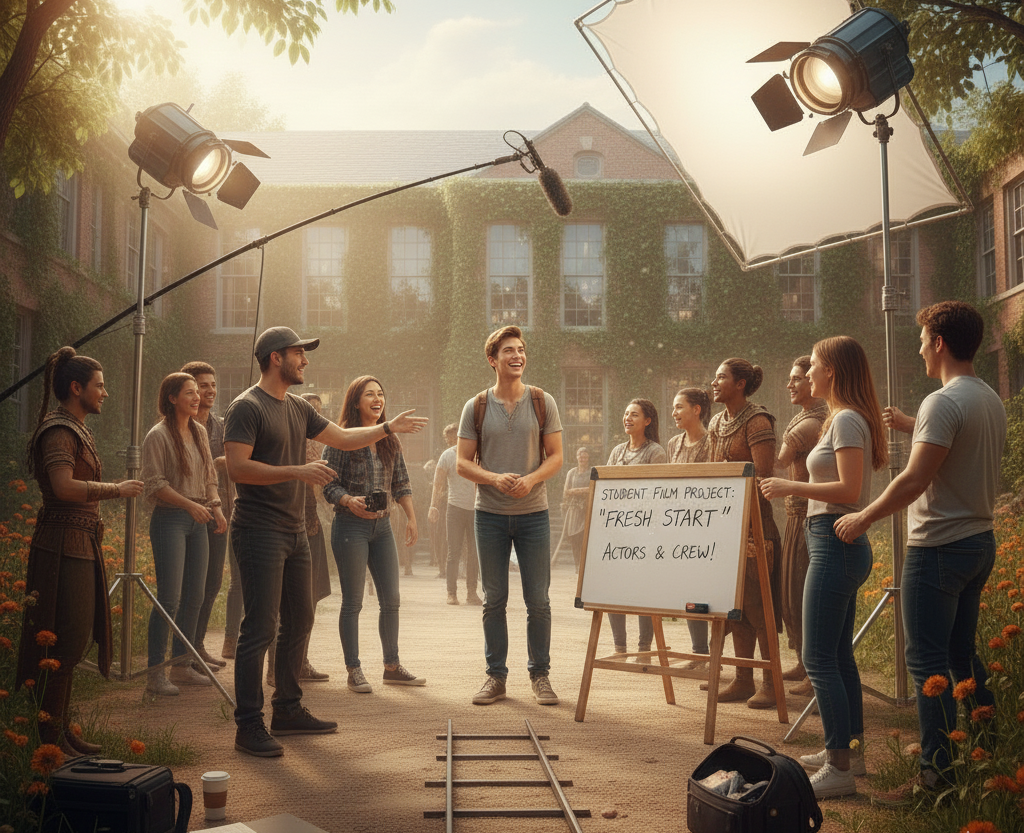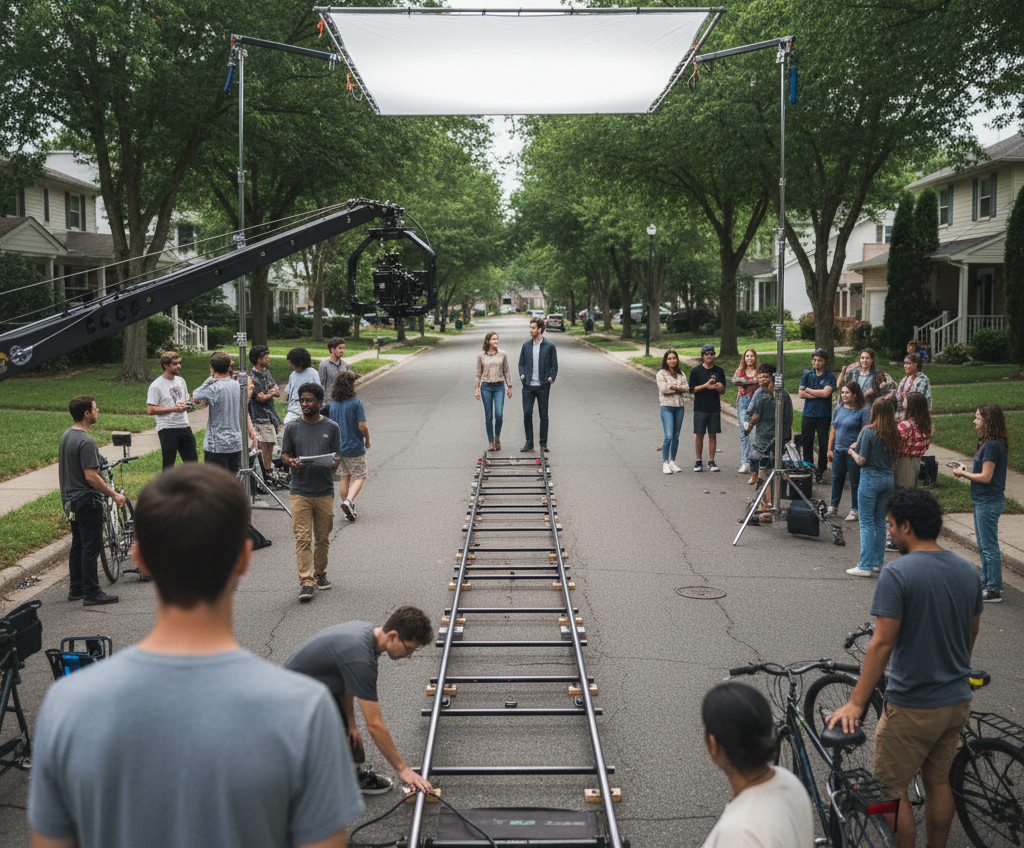How To Get An Acting Role In Film
The Practical Guide to Booking Your First Part
So, you want to be a film actor? That’s awesome! It’s an exciting path. Nevertheless, figuring out how to get a film acting role can feel like finding buried treasure. The good news? You don’t need a secret map. Instead, it simply takes dedication, practical steps, and knowing where to look.
Therefore, this guide gives you an encouraging, no-nonsense road map. Use it whether you’re starting from “zero” or conversely, already have a few credits.
Starting from “Zero”: Your Essential Roadmap to Securing a Film Acting Role
Before anything else, before you chase a life working only in Hollywood movies, you need to build your on-set experience. Get your best footage for your acting reel. Furthermore, understand a film production’s flow. To put it plainly, here, you put in the foundational work.
Get Busy on Student Films for Your First Professional Acting Role
If you’re just starting out, student films are your best friends. Why? These student filmmakers are just starting out, too. Consequently, they need actors. In the same way, you need set experience for a film acting role. They offer low-pressure environments. Everyone learns. Everyone experiences the same aspiration for filmmaking. Cherish those relationships. Because of this mutual beginning, you never know what opportunities may flourish as your careers progress. Specifically, student films offer three huge benefits:
- Experience: You’ll get comfortable with set terminology. Moreover, you’ll prepare your best acting work. You’ll practice improvising based on production flow.
- Footage: You will accumulate great acting clips doing these film projects. Subsequently, get good at editing your own acting reel.
- Networking (We’ll get to this!): Remember the people you worked with. Have fun with your Co-Stars. Lighten the energy for the crew members. After all, the student director who hires you now might star you in their next feature film.
Check out student film auditions at your local University or Community College. Use social media or a website. Think of these jobs not as free labor. Rather, they are invaluable, free training.
Casting Profiles for Student Films: While some student productions still rely on localFacebook groups, many university filmmakers use industry-standard platforms. These include Actors Access or Casting Networks (We’ll also get to this!) for larger, more serious projects. Getting familiar with setting up a free profile now prepares you for the next step. Crucially, make sure your profile includes a professional headshot. Even a well-lit simple one works. Also, add your simple, one-page resume listing your training.
Becoming Unmissable: Social Media and Networking for Acting Roles in film
The casting world has gone digital. This is fantastic news for actors. You must master the art of email etiquette. In addition, practice general online communication. Have a strong online presence. You don’t need a huge following. People just need to understand who you are. They must see your work. Ultimately, they determine if they can work with you.
Digital Casting: Where to Look for Acting Roles in Film
Social media often provides the fastest way to hear about micro-budget films, shorts, and web series roles.
- Facebook Groups: Search for local Facebook groups. Try searching for “[Your City] Film & TV Casting.” Likewise, also try “Non-Union Actors in [Your State].” Filmmakers and independent casting directors post dozens of roles here every day. Pay attention to the posting rules. Above all, submit exactly what they ask for!
- Instagram: Even though less formal for submissions, Instagram is essential for branding and visibility. Follow local casting directors. Follow production companies and student film programs. Keep your profile professional. Link to your acting website/reel. Therefore, use hashtags like #actorlife #[YourCity]Film. When you book a gig, celebrate it! Understand your audience. Make yourself visible.
Real-World Networking and the Power of Word of Mouth
No matter how digital the world gets, the film industry still runs on relationships. Consequently, Networking is not about handing out business cards. On the contrary, it’s about forming organic connections with other artists. Be genuinely curious. Don’t appear needy. If your intuition tells you to ask that person something you genuinely want to know with no attachments, you found gold.
The Secret Life of a Background Actor: Paid Set Experience for a Speaking Role
Working as a background actor (or “extra”) offers a smart, paid way to gain on-set experience. Prepare yourself for a future film acting role. While you won’t deliver lines, you are getting invaluable training and a paycheck.
- Register with Agencies: Google “[Your City] Background Casting.” Alternatively, also try “[Your State] Extras Casting.” These companies focus only on extras. They staff major films and TV shows.
- Create a Profile: You must register with them. To begin with, provide accurate sizes (clothing, shoes, etc.). Upload simple, clear photos. You don’t need professional headshots yet.
- Monitor Breakdowns: Casting calls will come via email or post on their sites. They look for specific “types.” Reply immediately with the exact information requested.
- Check Social Media: Smaller, local independent projects often post for extrass. Generally, they use the same local Facebook Groups you check for non-union acting jobs.
What You Gain on Set (Beyond the Paycheck)
- Learn By Watching: Your job is simple: fill the space. However, your real job is to observe. Watch how the lead actors interact. See how the director gives notes. Observe how the crew operates. Watch how a big production moves. Simply put, you can’t get this on-the-job training in a class. Consider it an internship!
- Networking on the Down-Low: You will meet dozens of PAs (Production Assistants) and department heads. Learn everyone’s role. Be professional. Furthermore, follow directions. Be friendly.
- The Golden Rule of Word of Mouth: People talk if you impress the crew. Be reliable, prepared, professional, and kind on set. Consequently, they will remember you. In fact, they may need you for a speaking role on their next project. This is the power of word of mouth. It’s how jobs find you when you aren’t even looking. Work hard. Be the person everyone recommends.
Mastering the Digital Gatekeepers: Casting Profiles for a Film Acting Role
You evolve from working on local student projects to pursuing paid professional film acting roles. At this stage, your online casting profile transforms into your virtual front door to the entire film industry. Essentially, these digital platforms are the prominent essential gatekeepers. Every legitimate casting director, agent, and manager finds talent here.
To be considered for professional film productions, you must maintain visibility on the top two core talent casting platforms. These are Actors Access and Casting Networks. As a rule, they expect you to maintain a complete, professional, and current profile on both. Keep your headshots, resume, and acting reel up to date. Do this only if you want to submit for a professional film acting role.

The Big Leagues: Securing Representation for a Major Acting Role in Film
Once you have achieved a great reel and enough experience to be professional on a major set, you’re ready to seek professional representation. This step proves crucial. For instance, the biggest, best-paying film acting roles remain only accessible to actors with an agent.
Understanding Agents vs. Managers for Your Acting Role Progression
This is where things can get confusing. Nevertheless, we’ll keep it simple:
- Agents: The agent’s job involves sending you on auditions. They negotiate the deals when you book. They are licensed by the state. They focus on the transactional side of the career. In short, they open doors to auditions you can’t reach yourself.
- Managers: In contrast, a manager focuses on your overall career trajectory. They might advise you on which classes to take. Furthermore, they help choose your headshots. They guide your brand. They determine when you are ready to seek an agent. Think of them as your career coach. They are your long-term strategist.
Many actors start with one or the other, or both. Crucially, remember: Agents book the work. Conversely, Managers guide the career. Don’t worry about this step yet. Wait until you have a polished reel and serious training. Instead, focus on being so good and so dependable. Your work will force an agent or manager to notice you.




